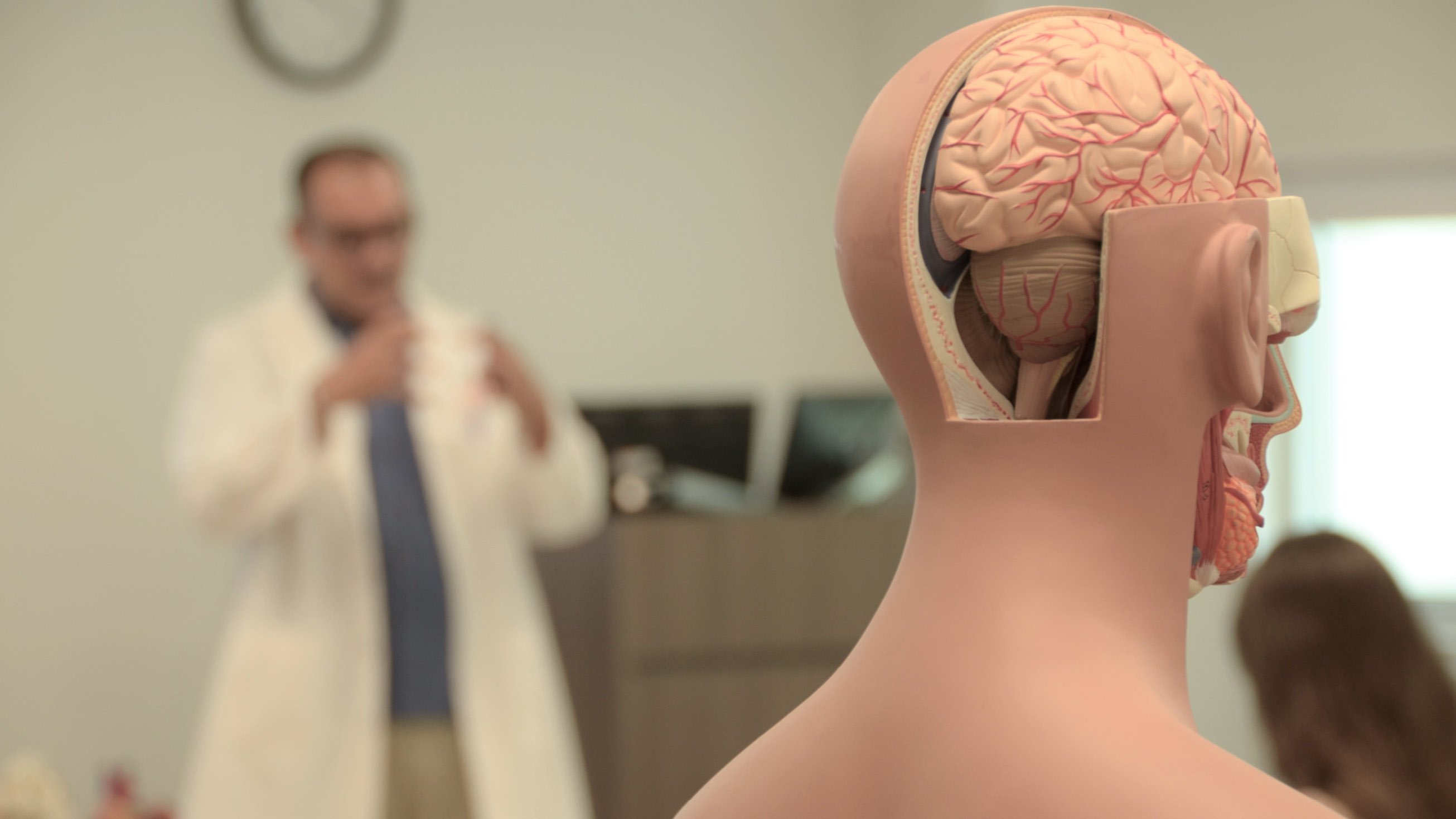Kathryn Gerber, a PhD in Nursing Science student at the University of Miami School of Nursing and Health Studies (SONHS), was recently awarded a grant from the Society of Trauma Nurses for her proposal, “Neuroinflammatory biomarkers, symptoms, and functional outcomes in individuals with moderate traumatic brain injury.”
Traumatic brain injury (TBI), such as from falls, gun shots, and car accidents, affects an estimated 2.8 million Americans, with 50,000 deaths and 282,000 hospitalizations annually. In fact, TBI-related emergency department visits, hospitalizations, and deaths more than doubled between 2006 and 2014, according to the CDC. Direct and indirect medical expenditures are estimated at $60 billion.
In addition to suffering a wide range of symptoms, from dizziness and pain to irritability and memory problems, individuals with a TBI can experience severe, lifelong impairment; current research has found correlations between TBI and Parkinson’s disease, for example, as well as other neurodegenerative diseases such as amyotrophic lateral sclerosis (ALS), chronic traumatic encephalopathy, and Alzheimer’s.
SIGNIFICANCE FOR TRAUMA NURSES
TBI is classified as either mild, moderate, or severe. To date, notes Gerber, individuals with moderate TBI have been understudied, and their symptoms are poorly defined, especially during the critical convalescence period of 3 to 12 months post-injury.
Given this knowledge gap, Gerber expects her study to provide needed insight into the relationship between relevant symptoms and disability. “Our findings will enable more appropriate, evidence-based care to be given to patients who have experienced a traumatic mechanism, namely TBI, and additionally will help guide trauma nurses in their clinical practice to better understand the connection between symptoms and functional outcomes in TBI patients and anticipate plan of care,” she says. “Longer-term, our findings may help biomarkers be incorporated into clinical guidelines and inform future intervention development.”

Gerber, the study’s principal investigator (PI), will use a comprehensive questionnaire to document the frequency and severity of physical, cognitive, and emotional symptoms of 125 study participants diagnosed with a moderate TBI sustained within the past 3 to 12 months. She will also investigate the relationship between the frequency and severity of moderate TBI symptoms and functional outcomes for patients, such as independence, disability, and quality of life.
Gerber’s exploratory aim in the study is to examine the extent to which four neuroinflammatory blood biomarkers previously implicated in TBI (IL-6, S-100ß, RAGE, and GFAP) moderate the relationship between symptoms and functional outcomes for study participants.
She is encouraged by data from multiple studies she has read suggesting that mitigating symptom burden in patients with TBI leads to greater functional ability. “These symptoms and their resulting burden affect patient outcomes and quality of life,” explains Gerber. “Addressing symptoms in individuals with moderate TBI early may salvage more function than had an intervention been delivered later on, whereas interventions may be less effective in the severe TBI population because of the significance of injury sustained.”
HARNESSING RESEARCH RESOURCES
The site for Gerber’s study is UHealth/Jackson Memorial Hospital in Miami. Additionally, Gerber will use the SONHS Biobehavioral Lab to analyze the neuroinflammatory biomarkers in blood drawn from study participants. Gerber’s multidisciplinary research team from SONHS includes her PhD advisor, Dr. Charles Downs, an associate professor (nurse scientist); Associate Dean for Research Dr. Victoria Behar-Zusman (psychologist); and Associate Dean for Health Studies Dr. Arsham Alamian, the study's statistical expert (epidemiologist). Serving as mentors and consultants on the grant are Dr. Gemayaret Alvarez-Gonzalez, medical director of neuro rehabilitation at Jackson Health System's Christine E. Lynn Rehabilitation Center, and TBI expert Dr. Jessica Gill, a senior investigator with the National Institute of Nursing Research/Johns Hopkins University.
Gerber obtained her BSN with honors from the University of Wisconsin-Madison, where she participated in research to help individuals living with Alzheimer’s disease and dementia. After three years as a bedside nurse in various settings, including medical-surgical, telemetry, and rehabilitation, Gerber was admitted to the PhD program at SONHS. She has since coauthored publications with SONHS faculty that have appeared in Public Health Nursing and other journals.
“Exposure to different faculty research initiatives as both a research assistant and lab team member at the School of Nursing and Health Studies has helped me obtain research skills and refine my own area of interest,” says Gerber. “I’m grateful to SONHS and the Society of Trauma Nurses for investing in my research and am hopeful I can contribute meaningfully to the scientific literature in TBI, which can improve outcomes for rehabilitating patients.”
The Society of Trauma Nurses is a professional nonprofit organization whose mission is to ensure optimal trauma care to all people locally, regionally, nationally, and globally through initiatives focused on trauma nurses related to prevention, education, and collaboration with other health care disciplines.

